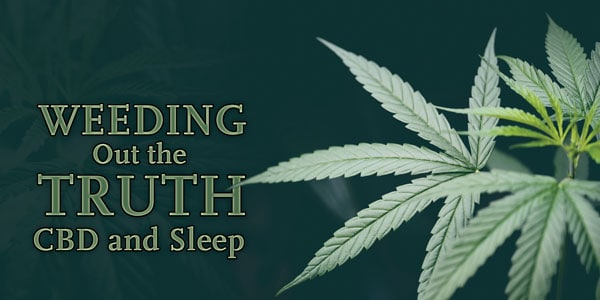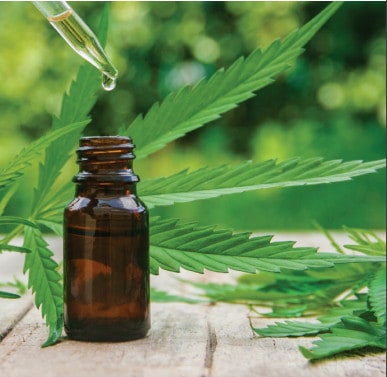Dr. Kent Smith offers sleep dentists information on CBD and sleep that can help in making decisions on whether it may help patients in your practice.
 by Kent Smith, DDS, D.ABDSM
by Kent Smith, DDS, D.ABDSM
You’ve seen it in nail salons and boutique stores. Heck, even gas stations are selling it. What’s the hoopla? Much has been written about cannabidiol, better known as “CBD,” and the majority of it has been offered in the forms of anecdotal evidence, conjecture, attempts to sell a specific product, or some combination of these. I won’t do much better with this article but will try to make the connection between CBD – wait, let’s say the “cannabis plant,” a much broader term – and sleep. Much of our information to date has been found by accident, but let’s start at the beginning.
The cannabis plant, containing over one hundred cannabinoids, has been around for thousands of years, so it wasn’t invented to give you a high or raise Cheetos’ stock. From this magical plant comes hemp and THC. The numerous products on the unregulated and unrestrained free market include various ratios of these two. An increase in the THC percentage provides a more psychoactive result; as the percentage of hemp increases, we see more health benefits. What’s the best ratio? Well, that depends on your needs, which largely depend on the stability of your own endocannabinoid system.
When we are in homeostasis, we have a healthy endocannabinoid system. Our emotional level is good, our digestive system is functioning properly, and we sleep well. If we have a clinical endocannabinoid deficiency (CED), we see more anxiety, migraines, IBS and yes, insomnia. This is where the phytocannabinoids, those coming from the cannabis plant, are helpful.
 In my sleep practice, I am often frustrated with my inability to “fix” every patient’s sleep problem. You have three happy patients on a Monday, then Susan Phillips comes in at 3:30 to go over a titration study and you get her AHI from 22 down to 3 – but she says she feels no better. You’ve all been there. I love the numbers and objective data, but treating symptoms has always been my primary focus, so when something becomes available that could help, I do my due diligence. When CBD became legal to grow and sell through the Farm Bill in December of 2018, I decided to take a look.
In my sleep practice, I am often frustrated with my inability to “fix” every patient’s sleep problem. You have three happy patients on a Monday, then Susan Phillips comes in at 3:30 to go over a titration study and you get her AHI from 22 down to 3 – but she says she feels no better. You’ve all been there. I love the numbers and objective data, but treating symptoms has always been my primary focus, so when something becomes available that could help, I do my due diligence. When CBD became legal to grow and sell through the Farm Bill in December of 2018, I decided to take a look.
I soon learned that since CBD is not regulated by the FDA. It has become the wild, wild west for CBD manufacturers, and there is no shortage that have cropped up. Independent studies have shown that some CBD bottles tested have not a drop of CBD. So, how do you first decide what brand to use?1 My suggestion is to look for the following in that bottle on the gas station counter or the one your neighbor is trying to sell you:
- Organically grown – Most will say this, and it is likely true, but it’s particularly important as the hemp plant is excellent at extracting everything from the soil, good or bad.
- Full spectrum – Any product that is not labeled this way likely has not used all 480 compounds of the plant. The entourage effect of a product is key to effectively treating the specific endocannabinoid deficiency in the
- Water soluble – As we are made of about 60% water, our ability to uptake and use any oil we ingest depends on its ability to dissolve into water. You can test this with your CBD oil by dropping 4-5 drops into a glass of water. If the drops bead up on top, it’s not water soluble and it takes a much larger quantity to produce the same
- Certified by the U.S. Hemp Authority – The bottle should be labeled this way, but you can also find a full list at https://ushempauthority.org/. They have vetted these companies using strict regulatory standards and testing by independent third parties to ensure that what the company says is in the bottle truly is.
- QR Code – Ideally, the bottle should have a code that allows you to investigate the company yourself by taking you to an independent third-party testing facility’s site. It will detail exactly what is in the batch that made that This is specifically important when you need to ensure the amount of THC in the bottle is less than .3%, which is the legal limit in most states.
Now that you’ve chosen your CBD oil, let’s discuss how it can help sleep.
- Anxiety – In one noteworthy study of 72 adults, 47 of them identified anxiety as a chief complaint and 25 with sleep as a chief complaint. Anxiety scores improved in 79.2%; Sleep scores improved in 66.7%.2
- Sleep stability – Endocannabinoid signaling through the CB1 receptor is necessary for NREM stability. With insomnia victims, CBD helps the endocannabinoid system work properly so that it can effectively modulate sleep cycles.3
- Pain relief – The only legitimate studies have been in rats, but we know that CBD prohibits the body from absorbing anandamide which is a compound we produce to regulate pain. An increase in the amount of anandamide in the blood stream may reduce the amount of pain the patient feels, thus leading to better sleep.
If you could improve homeostasis in your patients and reduce their anxiety, pain, and insomnia, would your patients have healthier sleep and even appreciate your efforts to treat more than their snoring? That was rhetorical.
In our office, we use one specific brand, and we have some of their promotional material on shelves in our operatories. I venture to say that it would take extreme effort to find a patient who had not heard of CBD. They see it and begin asking questions. I can go into as little or as much detail as they want, but they know we are not pushing anything – just offering a potential answer for their sleep struggles. An important point that is not well known – CBD has an excitatory component to it, so it should not be taken at bedtime. I suggest a regimen of ½ ml in the morning and again at dinnertime, but never too close to bedtime.
Sometimes we offer our CBD oil at no charge for the patients struggling to pay for their sleep appliance, but most pay for it. A word of caution – some credit card companies will not allow you to charge for CBD using their systems, and you could get your hand slapped if it’s on your website. Sell it on a cash basis or just create a handout that tells them what to look for in a good CBD oil. You don’t have to provide it in your office, but you owe it to your patients to have a working knowledge of how it can help their sleep.
While some dentists consider CDB and sleep as a new concept, some have reduced anxiety with a device that produces a relaxation response. Read about it here: https://dentalsleeppractice.com/practice-management/recover-repair-and-heal-from-super-stress-with-braintap/
- “Penn Study Shows Nearly 70 Percent of Cannabidiol Extracts Sold Online Are Mislabeled – PR News.” Penn Medicine News News Release, Penn Medicine News, 7 Nov. 2017, www.pennmedicine.org/news/news-releases/2017/november/penn-study-shows-nearly-70-percent-of-cannabidiol-extracts-sold-online-are-mislabeled.
- Shannon, Scott, et al. “Cannabidiol in Anxiety and Sleep: A Large Case Series.” National Institutes of Health, The Permanente Journal, 7 Jan. 2019, www.ncbi.nlm.nih.gov/pmc/articles/PMC6326553/.
- Pava, Matthew J, et al. “Endocannabinoid Signaling Regulates Sleep Stability.” PloS One, Public Library of Science, 31 Mar. 2016, ncbi.nlm.nih.gov/pmc/articles/PMC4816426/.
 Kent Smith, DDS, D.ABDSM, is the founding director of Sleep Dallas, a dental sleep medicine practice serving the Dallas-Fort Worth metroplex. Smith is president of the American Sleep and Breathing Academy, a Diplomate of the American Board of Dental Sleep Medicine, and is on the advisory committee of the Australasian Academy of Dental Sleep Medicine. In addition to running his practice, Smith is the founder and primary facilitator of 21st Century Sleep Seminars, a series of training events that prepares dental professionals to incorporate dental sleep medicine into their practices. Smith has also created curriculum for a course focused on recognizing and treating sleep breathing disorders at the Las Vegas Institute of Advanced Clinical Studies.
Kent Smith, DDS, D.ABDSM, is the founding director of Sleep Dallas, a dental sleep medicine practice serving the Dallas-Fort Worth metroplex. Smith is president of the American Sleep and Breathing Academy, a Diplomate of the American Board of Dental Sleep Medicine, and is on the advisory committee of the Australasian Academy of Dental Sleep Medicine. In addition to running his practice, Smith is the founder and primary facilitator of 21st Century Sleep Seminars, a series of training events that prepares dental professionals to incorporate dental sleep medicine into their practices. Smith has also created curriculum for a course focused on recognizing and treating sleep breathing disorders at the Las Vegas Institute of Advanced Clinical Studies.